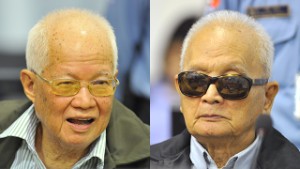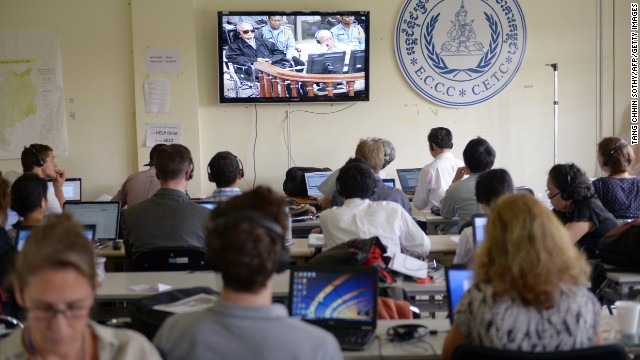Some victims of the crimes of the regime were not satisfied by the verdict. Theary Seng, founding president of the Center for Cambodian Civic Education, told CNN that Cambodia "hasn't got to the heart of the genocide.
"It's a missed opportunity... it completely missed the mark. What have we seen from $200 million and eight years (of the existence of the ECCC)? (It is) really a disservice to the other Cambodian victims."
Top Khmer Rouge leaders found guilty of crimes against humanity, sentenced to life in prison
STORY HIGHLIGHTS
- Two top leaders of Cambodia's 1975-79 Khmer Rouge regime found guilty of crimes against humanity
- Both men sentenced to life imprisonment
- Nuon Chea was the regime's "Brother No. 2" and Khieu Samphan its "No. 4"
- The men are the first Khmer Rouge leaders ever to face justice
(CNN) -- Two former top leaders in Cambodia's
notorious Khmer Rouge, which ruled the Southeast Asian country between
1975 and 1979, were found guilty of crimes against humanity by a
specially-convened Cambodian court Thursday.
Before the verdict, only one person had been brought to justice over one of the 20th century's great atrocities.
Nuon Chea, the former
Deputy Secretary of the Communist Party of Kampuchea, and Khieu Samphan,
the one-time President of Democratic Kampuchea both received life
sentences.
 Activist: Court did disservice to victims
Activist: Court did disservice to victims
Nuon Chea, 88, known as
"Brother Number Two," and Khieu Samphan, 83, known as "Brother Number
Four," were expressionless as the verdict was read.
They were found guilty of
the following: Crimes against humanity, of extermination, murder,
political persecution, and other inhumane acts comprising forced
transfer, forced disappearances and attacks against human dignity
committed within the territory of Cambodia between 17 April 1975 and
December 1977.
"The chamber finds that
as a consequence of the crimes of which the accused have been convicted,
the civil parties and a very large number of additional victims have
suffered immeasurable harm, including physical suffering, economic loss,
loss of dignity, psychological trauma, and grief arising from the loss
of family members and close relations," a judge said in the ruling.
The men were taken into
custody after their arrest in 2007. The defendants can appeal the
judgment, and Victor Koppe, part of Nuon Chea's defense team, indicated
that they would be seeking to exercise that right.
The charges were heard in Phnom Penh in the Extraordinary Chambers in the Courts of Cambodia
(ECCC) -- a special United Nations-backed tribunal that was formed in
2006 to prosecute senior Khmer Rouge leaders and other regime figures
responsible for especially heinous acts.
Amnesty International welcomed the result as an important step towards justice.
"This long-awaited
ruling is an important step towards justice for the victims of the Khmer
Rouge period and highlights the importance of addressing impunity,"
said the organization's Deputy Asia-Pacific Director Rupert Abbott
"But the earlier refusal
of senior Cambodian government officials to give evidence, as well as
allegations of political interference in other ECCC cases, is troubling
and raises concerns around the fairness of the proceedings and respect
for victims' right to hear the full truth regarding the alleged crimes."
Amnesty also welcomed the court's decision to endorse 11 reparation projects for victims.
"However, much more must also be done by the government of Cambodia towards repairing the harm suffered by victims."
A bloody regime
The two men were senior
leaders in the Khmer Rouge regime, which ruled Cambodia between 1975 and
1979. During that time at least 1.7 million people -- about a quarter
of the Cambodian population -- are believed to have died from forced
labor, starvation and execution, as the movement ruthlessly executed its
radical social engineering policies aimed at creating a purely agrarian
society.
The pair were tried in a
"hybrid" tribunal -- officially "an ad hoc Cambodian court with
international participation" -- uses both Cambodian and international
judges and staff employed by the U.N. in order to ensure the trials are
conducted to international standards and to mitigate against the
weakness of the Cambodian legal system.
"This judgment
represents an important milestone for Cambodians and victims around the
world," a joint statement from the office of the co-prosecutors read.
"For 35 years (the leaders of the regime) evaded justice for some of
some of the most brutal and cruel crimes ever committed."
Around 3,500 victims participated in the trial, as witnesses giving evidence, observers and in seeking reparations.
"The trial has allowed
Cambodia to reset its moral compass, which was destroyed by the accused
40 years ago," the statement said.
Until today's conclusion, the ECCC had delivered only one verdict in its eight years of existence.
In the ECCC's Case 001, Kaing Guek Eav, commonly known by his alias, Duch, was sentenced to life imprisonment
following his 2010 convictions for war crimes, crimes against humanity,
murder and torture. He was the commandant of the notorious Tuol Sleng
S-21 prison in Phnom Penh, where more than 14,000 people died.
The verdicts on Thursday in the case known as 002/01 was the first time that senior leaders of the regime have faced justice.
Disappointment
Some victims of the
crimes of the regime were not satisfied by the verdict. Theary Seng,
founding president of the Center for Cambodian Civic Education, told CNN
that Cambodia "hasn't got to the heart of the genocide.
"It's a missed
opportunity... it completely missed the mark. What have we seen from
$200 million and eight years (of the existence of the ECCC)? (It is)
really a disservice to the other Cambodian victims."
She did allow that the
trial was the "beginning of a process of healing" and that it would
"serve as a catalyst for conversations in Cambodia about our past."
Seng was just seven
years old in 1978 when both her parents were killed after several months
in prison. It was at a time when the leadership was, she said, in
"extreme paranoia" and even party cadres were being purged. Her mother
was taken from the cell she shared with her children and other families,
and "tiptoed to her death" to avoid waking up Seng and her younger
brother.
"The tragedy of my story is that it's so common," she said. "It stays with us -- how can it not?"


 Cambodian and international
journalists watch a live video feed showing the verdicts in the trial of
former Khmer Rouge leader "Brother Number Two," Nuon Chea, and former
Khmer Rouge head of state Khieu Samphan, August 7, 2014.
Cambodian and international
journalists watch a live video feed showing the verdicts in the trial of
former Khmer Rouge leader "Brother Number Two," Nuon Chea, and former
Khmer Rouge head of state Khieu Samphan, August 7, 2014.
No comments:
Post a Comment